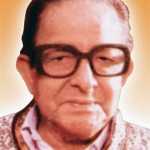We housed them in prisons
For they wanted a home,
We killed them for they wanted eternal life
Then bulldozed their prisons into fields of corn.
What's that hand sticking out from the earth?
Other hands will sprout from it—
And tickle us to death.
15-02-2024 20:28:48
The opening lines reflect the harsh truth of how individuals seeking a place to call home are often met with imprisonment instead. It highlights the inherent injustice and cruelty that exists within certain systems. Moreover, the act of killing those who desire eternal life serves as a metaphorical representation of society denying people their dreams and aspirations.
15-02-2024 20:30:26
Overall, this poem compels us to reflect on the consequences of our actions, emphasizing the importance of compassion and understanding in a world that often perpetuates injustice. It serves as a powerful reminder that our choices have the power to shape our own fate.
31-05-2024 18:04:18
The imagery of bulldozing their prisons into fields of corn symbolizes the disregard for their existence and the cycles of destruction and transformation. The concluding lines suggest a sense of retribution and justice, as the hands emerging from the earth evoke a haunting reminder of the lives that were lost and the potential consequences of our actions. Overall, the poem conveys a powerful message about the consequences of oppression and violence.





